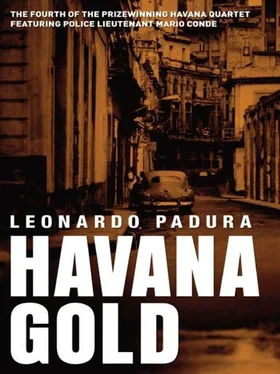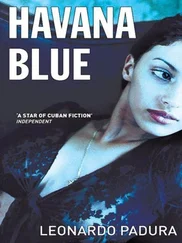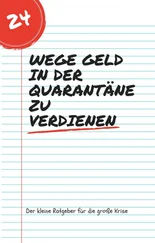A quarter to six and still no call. Rufino , his fighting fish, quickly circled the interminably spherical goldfish bowl and came to a halt very near the bottom. Fish and policeman looked at each other. What the hell you looking at, Rufino? Get swimming, fish – and as if to obey him, the fish resumed its eternal rondo. The Count had decided to divide the time into quarters of an hour and had already counted off five equal slices of time. At first he tried to read, looked on every shelf of his bookcase and gradually discarded every possibility that at other times he’d thought more or less tempting. It was true he could no longer resist Arturo Arango’s novels, the guy wrote lots and lots, always about crazy types who wanted to go back to live in Manzanillo and reclaim innocence through a lost girlfriend; forget about López Sacha’s short stories, far too wordy and recherché and longer than a life sentence; he’d sworn never to read Senel Paz again, so many yellow flowers, yellow shirts, if only he’d write something a bit more devilish one day… he might suggest to him, for example, that he write a tale about a party member and a queer; and Miguel Mejides, forget him, to think he’d once liked his books, the yokel writes so badly and so pretentiously à la Hemingway. So much for contemporary literature, he muttered, and decided to try again with a novel that he’d thought the best from what he’d recently read: Horse Fever . But he couldn’t concentrate enough to enjoy the prose and barely got past the second page. Then he tried to put some order into his room: his house was like a storehouse of the forgotten and deferred and he swore he’d spend Sunday morning washing shirts, socks, underpants and even sheets. Washing sheets, what a horrible thought! And the quarters of an hour fell by the wayside, heavy, like clockwork. Telephone, for fuck’s sake, I’ll give you anything: just ring. But it didn’t. He took it off the hook for the fifth time to check it was working, and returned the phone to its cradle when he had recourse to the most desperate of measures: he would bring to bear all his mental powers, which were there to serve some purpose. He placed the telephone on a chair and another opposite the telephone. Naked, he sat in the empty chair and after critically eyeing his moribund testicles hanging in the air – and spotting two grey hairs – he concentrated, started looking at the gadget and thought hard: You’re going to ring now, you’re going to ring right now, and I’m going to hear a woman’s voice, a woman’s voice, because you’re going to ring now, and it’s going to be a woman, the woman I want to hear because you’re going to ring, now, and he jumped up, “Fuck”, his heart beating like mad, when the phone really did ring loudly and the Count heard – also for real, salvation at last – the voice of the woman he wanted to hear.
“Sherlock Holmes, please. Professor Moriarty’s daughter here.”
The Count’s ego was having a ball. He’d always been vain and arrogant and when he could show off his gifts, he did so mercilessly. He stood in the entrance to his house and greeted every passing acquaintance and prayed Karina would pick him up when he had the biggest audience. He’d watch her drive up, all casual, and walk slowly over… Hey, look at that lucky Count. Hell, a chick with a car and so on. He knew the points that item was worth in the ratchet of values upheld by people in the barrio and he wanted to exploit it to the max. A pity the surly wind had scattered the group on the street corner, who’d scurried into some safe haven to down their twilight, troublesome alcohol, and a pity that they’re shutting the liquor store because nothing liquid had arrived to attract a queue. The afternoon was getting far too quiet for his liking. Besides, he’d put on his glad rags: pre-washed jeans he’d bought with Josefina’s help and a checked shirt, soft as a caress, sleeves rolled up to the elbows, worn for the first time to honour that special night. And he smelled like a flower: Heno de Pravia, a present from Skinny on his last birthday. He could have kissed himself.
He finally saw her drive past his place, twenty minutes after they’d agreed, reach the corner and U-turn before stopping on his side of the pavement, with a back wind and prow pointing promisingly towards the dark heart of the city.
“Am I very late?” she asked kissing his cheek warmly.
“Not at all. Three hours and no more is fine for a woman.”
“Got to the bottom of the mystery?” she smiled, starting the engine.
“Hey, it’s not a joke. I really am a policeman.”
“Yes, I know: a detective like Maigret.”
“All right, if you must.”
The small contraption jerked into motion, not quite ready for the off, then sped off down the half-empty street. The Count entrusted his fate to the god who’d blessed the greenback hanging in the window and thought of Manolo.
“So where are we headed then?”
She drove with one hand and with the other tidied away the unruly hair that kept falling over her eyes. Could she see the road? She’d made up immaculately and was wearing a loose-fitting dress: its mauve flowers on a green background and its precise cut aroused the Count’s desires; down south, where her knees were parted, and up north low down the back and deep into a swooping neckline. She looked at him before replying and the Count thought he had on his hands a woman who was too much of a woman, one he would fall hopelessly in love with: a feeling in his chest, a judgement that brooked no appeal.
“Do you like Emiliano Salvador?”
“Enough to marry him?”
“Ah, so you like a joke too?”
“Dearie, I worked as a clowning policeman in the circus and people loved it when I interrogated the elephant.”
“Seriously, if you like jazz, we can go to the Río Club. Emiliano Salvador’s group’s playing. I can always get a table.”
“Anything for jazz,” the Count agreed telling himself it was a good idea to start with instruments that improvised everything in a life some great master had taped so well there was little margin for variation.
He thought the city seemed quieter, more promising, even cleaner from inside that car although he doubted his impressions were anything but circumstantial. But so what: he felt happy and relaxed with that chauffeur, sure he wasn’t going to die in any stupid traffic accident; Lissette, Pupy, Caridad Delgado’s decline, Fabricio’s loutishness and Candito’s reproaches meant little as they moved relentlessly towards music in the night and, of this he was more than sure, towards love.
“So I have to believe you’re a policeman. A real policeman, one who calls the shots and puts you in jail and fines you for bad parking. Tell me who you are and I’ll start believing in you.”
Once upon a time, a long time ago, there was a boy who wanted to be a writer. He lived peaceful and happy in a not very tranquil, or even beautiful dwelling, not far from here, and spent his time, like all happy boys, playing baseball in the street, hunting lizards and watching how his grandfather, whom he loved a lot, groomed his fighting cocks. But every day he dreamed of becoming a writer. First he decided to be like Dumas, the father, the real one, and to write something as fabulous as The Count of Monte Cristo , until he fell out forever with the infamous Dumas for writing a sequel to that promising book entitled The Deadman’s Hand : it’s a very petty act of revenge for all the happiness granted to Mercedes and Edmund Dantès. But the lad persisted and looked for other heroes who went by the name of Ernest Hemingway, Carson McCullers, Julio Cortázar and J.D. Salinger, who writes such moving, squalid stories like the ones about Esmé or the tribulations of the Glass family. But the story of our lad is like the biography of all romantic heroes: life began to put hurdles before him to overcome, which didn’t always come in the form of dragons, the lost Grail or changed identities. Some arrived wrapped round in deceit, others were hidden in the depths of incurable sorrow, others were like a garden of forking paths, and he was forced to take an unexpected path that led him away from beauty and imagination and threw him, pistol in belt, into the shadowy world of bad guys, and only bad guys, among whom he must live thinking he was the good guy charged with re-establishing the peace. But our youngster, who is no longer so young, kept dreaming that one day he would spring the trap set by destiny and return to the original garden, back to the path he’d always dreamed of… In the meantime, he kept leaving behind affections that die on him, loves that putrefy, and days, endless days, devoted to walking through the city’s filthy sewers, like the heroes of The Mysteries of Paris . The lad is alone. To feel less alone he visits whenever he can a friend who lives in a cold, damp attic he can’t leave, because he’s been paralysed ever since the bad guys wounded him in a war. He was a great friend, you know? He was his best friend, a true knight who had been victorious in many a crusade and was only brought to heel by a treacherous wound, after being tied and gagged. So he goes to see his friend every night, and talks to him of his daily deeds, the wrongs he has to right, and tells him of his joys and his sorrows… Until one day he tells him he may have found his Dulcinea – from La Víbora, not from distant Toboso – and that he’s dreaming once again of writing and, more than dreaming, he is writing, of happy memories and nights of anguish, only because the magic halo of love that his princess Dulcinea wrapped round him brings him back to his dreams, to the most alluring… And everything must end happily ever after: the youngster, who is no longer so young, goes out one day to listen to music with his Dulcinea and they cross the city that is lit up, full of smiling, pleasant people who greet them because they respect the happiness of others, and they dance the night away, until the bell rings twelve times, and he confesses that he loves her, that he dreams of her more than of literature or the horrors from the past, and she tells him she also loves him and they live happily together and have lots of children and he writes lots of books… Oh, that’s if the evil genie doesn’t interfere and on the stroke of twelve Dulcinea doesn’t flee forever without even leaving a glass slipper behind. And then he’ll wonder: what can her shoe size be? And here ends this extraordinary story.
Читать дальше











